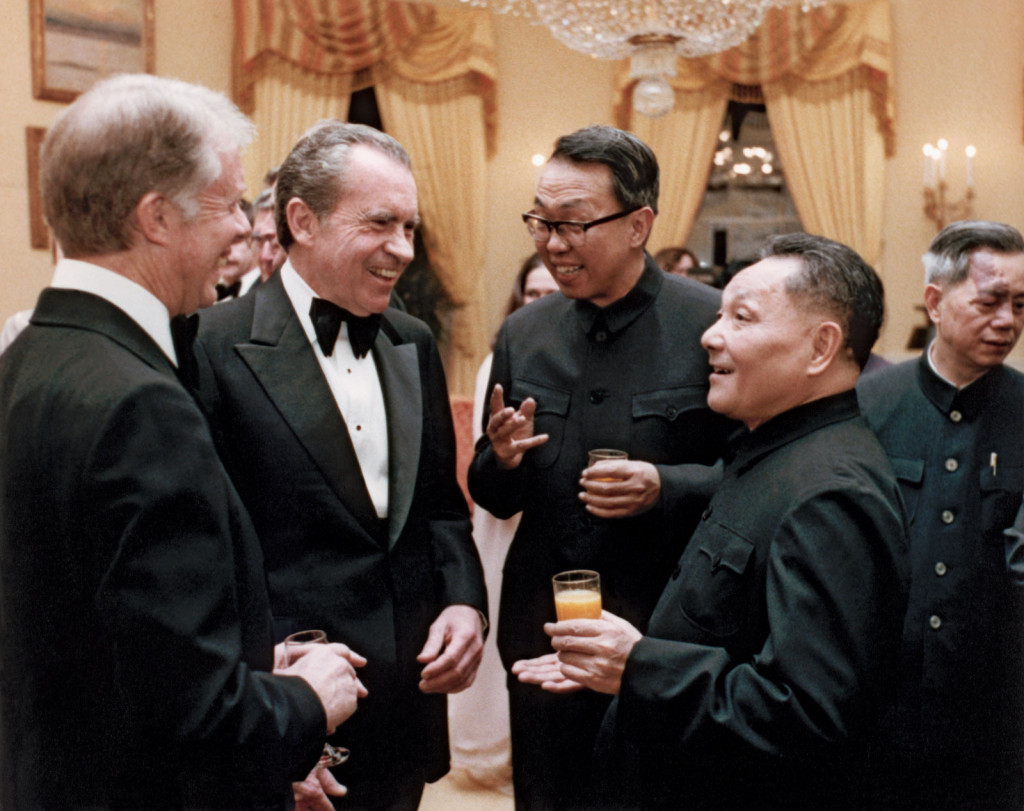
In 1972, President Nixon – thanks to the wily diplomacy of his national security advisor, Henry Kissinger – cemented one of his more favorable legacies: opening Communist China to the West. (Despite his infamous reputation in the West, he’s still China’s favorite recent American president.) In fact, the Nixon-Kissinger duo was said to be the most talented ever to run American foreign and security policy.[1] As evidence of his vision, Nixon even stressed the importance of normalizing relations with China before his 1968 campaign because he was eagerly looking for a potential ally to counterbalance the Soviet Union.
The Chinese were secretive (as always) about their plans for connecting with the Americans, even planting a spy within the US intelligence community decades before Nixon’s announcement to visit Beijing. This human intelligence (HUMINT) operation turned out to be a highly successful, if not the most successful, Chinese penetration into the CIA known to date—and, out of sheer luck, catalyzed China’s policy toward the United States.
That spy was Larry Wu-Tai Chin, whose position as a Chinese language specialist in the CIA’s Foreign Broadcast Information Service (FBIS) offered China valuable insights into US policy towards China.[2] By using the intelligence Chin provided, China accordingly shaped its foreign policy toward the US and other nations to appear a less threatening communist regime.[3] Although Chin operated as a Chinese spy undetected for more than three decades, he was eventually exposed – along with many other foreign spies working within the US intelligence community — in 1985, “The Year of the Spy.”
In Chin’s defense, he claimed that he was passing documents in order to improve the mutual understanding between the American and Chinese governments. However, where his true loyalties lay is questionable. He became a naturalized US citizen, but betrayed the States. He also lied to China; without telling the Chinese he had retired from the CIA and lost access to top-secret documents, Chin translated open-source information and pretended they were classified so that he could still get paid.[4] By spying for China over the years, Chin was able to acquire 33 properties in Washington, DC and Las Vegas, while spending a fortune on gambling and prostitution.[5] For whatever reasons Chin had when he first began spying for China, it seemed at the end what drove his betrayal was money over patriotism.
Players
China’s Ministry of Public Security (MPS) recruited Chin as an asset in 1944, the same year he started working for the US as a translator for an Army liaison office.[6] Chin’s career advanced quickly, and he joined the CIA in 1952. Although he was only working at the FBIS in Okinawa – an open-source intelligence center that monitors radio broadcasts from around the world – Chin had access to classified intelligence. He relayed both the names of US spies working in China and the names of their assets so that the MPS could arrest the assets before they leaked any more information.
After Chin became a naturalized citizen through marriage, he was offered a position at FBIS’ headquarters in Virginia. Although FBIS operated as an open-source center, many classified files would go through Chin’s desk every day. Before offering Chin a top-secret security clearance, a background check had to be conducted. The Agency was able to track down most of Chin’s adulthood, but nothing from his early years in Mainland China. China’s closed nature to foreign states offered Chin a perfect, natural protection from America’s prying eyes. However, this informational gap did not seem to bother the CIA—a grave oversight. Chin was also able to cheat a polygraph test before being granted a top-secret security clearance.[7] Chin later admitted he probably would not have passed the test if the questions had been asked in Mandarin.[8] Both the background check and the polygraph failings were weaknesses of the CIA recruitment process that played right into Chin’s advantage.
Another important piece of the puzzle was Yu Zhenshan, code name PLANESMAN. Yu was a senior intelligence officer in the MPS who was recruited by the CIA a year before he reported on Chin’s penetration.[9] Yu warned the CIA that a Chinese national working for the agency was actively spying for China. Because of Yu’s senior position, he had access to information only available to Chin’s handler in the MPS.
After PLANESMAN warned the CIA of a Chinese spy, the Agency conducted a fruitless internal investigation. Then, the case was turned over to the FBI’s Chinese Foreign Counterintelligence Squad. In order to confirm Chin was the spy, the FBI assembled a chronology of Chin’s trips to Hong Kong and crosschecked it with the intelligence PLANESMAN provided. After the confirmation, the FBI team had to gather prosecutable evidence. However, by then, Chin had already retired from the CIA; it would be nearly impossible for the FBI to catch him red-handed. The FBI team overcame this challenge by intercepting Chin’s phone conversations.[10] Although the intelligence proved insufficient for prosecution, it helped the FBI agents better understand Chin’s motivation and character. Chin was obsessed with sex, frequently engaging in phone sex with young women. He was also desperate to stay in touch with his CIA colleagues so that he could sell their secrets to Beijing in order to maintain a luxurious lifestyle.[11]
Impact on Policy and Related Ethical Issues
For China, Chin’s penetration into the CIA was extremely valuable. In addition to, among other items, National Intelligence Estimates (NIEs) and classified documents released by the National Foreign Intelligence Board, Chin gained access to the Presidential Review Memorandum outlining President Nixon’s intentions to reestablish diplomatic relations with China.[12] Chin used the success of Nixon’s first trip to Beijing as his defense for espionage by claiming he had advanced understanding between the two countries.[13] Disregarding the fact that Chin committed treason to the US, the intelligence he provided to China was in support of the policy to reestablish diplomatic relations. Under the just intelligence model – an ethical framework used to measure whether intelligence operations are suitable – it was in China’s national security interest to penetrate into the CIA because China was assessing whether the US could be a partner in counterbalancing the Soviet Union[14] or a threat because the US was economically and militarily stronger than China.
For the US, Chin’s penetration had a mixed outcome. On one hand, Nixon’s Open Door Policy proved to be very successful. However, it is impossible to know the true value of Chin informing the Party about Nixon’s impending visit. On the other hand, the Korean War dragged on longer than it should have thanks to Chinese interferences. Chin had provided information to the Chinese that they used as leverage to negotiate forcible repartition with the Americans, and the Chinese took their time to secure a better bargain.[15]
Under the just intelligence model, it was in the US’ national security interest to penetrate the Chinese with PLANESMAN: the US-China relationship had just begun; there was an urgent need to better understand Communist China and how the ever-changing Chinese political atmosphere operated. As a result, the policymakers could use the intelligence obtained about China to make decisions on whether or not to deepen diplomatic relations. On the other hand, prosecuting Chin and igniting a tabloid-worthy spy scandal might generate unforeseen consequences including expulsion of diplomats, or worse, a failed trade agreement.[16] The US-China relationship was too delicate and valuable to jeopardize.
Lessons for Today
Since the “Year of the Spy” scandal, not only has the nature of spy craft changed dramatically through modern technology, but also the US-China relationship has evolved, teetering between rivals and allies. Yet, today, the mistrust between these two giants is shown more often in virtual spaces than in human operations such as Chin and PLANESMAN. For instance, in early 2013, a private US security company Mandiant, contracted by the US government, identified and reported hacking on the US by Chinese Army Unit 61398 located in the outskirts of Shanghai. The Mandiant report stirred a media frenzy, followed by an executive order issued by President Obama urging Congress to approve bolstering American cybersecurity for critical infrastructure. China denied the hacking allegations detailed in the Mandiant report, and also claimed to be a victim of American cyber-attacks. After the Edward Snowden revelations, China has banned both the use of Windows 8 on government computers, and the purchase of Apple products by government officials fearing American manipulation.
The planting of spies such as Chin and PLANESMAN were certainly operations motivated by national security concerns, but ones justified by advancing mutual understanding between China and the US. But then what could be the justification for cyber attacks today – decades after political and economic thawing – other than mistrust and political gamesmanship? Escalation and continued cyber bullying by both countries endangers a valuable and necessary partnership, one ironically catalyzed by the notorious Larry Wu-Tai Chin and President Nixon.
The views expressed by these authors do not necessarily reflect those of the Glimpse from the Globe staff, editors, or governors.
Other Works Cited
[1]Andrew, Christopher M, For the President’s Eyes Only: Secret Intelligence and the American Presidency from Washington to Bush (New York: HarperCollins Publishers, 1995), 351.
[2]Gertz, Bill, The China Threat: How the People’s Republic Targets America, (Washington, DC: Regnery, 2000), 34.
[3] Gertz, 55
[4]Hoffman, Tod, The Spy Within: Larry Chin and China’s Penetration of the CIA (Hanover, NH: Steerforth Press, 2008), 65.
[5]Wise, David, Tiger Trap: America’s Secret Spy War with China (New York, NY: Houghton Mifflin Harcourt, 2011), 204.
[6] Wise, 203.
[7] Wise, 203.
[8] Hoffman, 49-50.
[9] Hoffman, 27.
[10] Wise, 206
[11] Hoffman, 56-8.
[12] Smith, Ivian C, Inside: A Top G-Man Exposes Spies, Lies, and Bureaucratic Bungling Inside the FBI (Nashville, TN: Nelson Current, 2004), 35-7.
[13] Wise, 212.
[14] Hoffman, 119.
[15] Smith, 33.
[16] Hoffman, 118-21.







